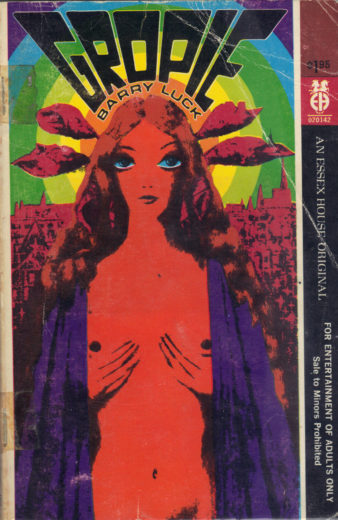 By BARRY LUCK (Essex House; 1969)
By BARRY LUCK (Essex House; 1969)
Yet another depraved dispatch from the late Essex House. GROPIE would appear to be the only book written by Barry Luck, an author about whom I’ve been to uncover very little information. GROPIE, for its part, is a fairly typical Essex House product, being a colorful sex odyssey steeped in counterculture language and attitudes.
The first person protagonist is Regis, a rock star based in San Francisco, where “The heads here are heads, baby, and they were all out tonight.” The novel follows him over the course of the night in question, which begins with Regis snorting coke and getting laid in his absurdly opulent mansion (“Man, if you couldn’t cut out of sight records in this place, give it up, baby”), before opening a package containing the amputated nipple of a particularly devoted fan.
More sex, and an equal amount of drug taking, are in store, including an electric prod enhanced bout in a limo and another in a glass booth (for the edification of Regis’s audience). From there Regis is kidnapped by a band of lesbian Satanists who torture and nearly kill him, but he’s rescued by Gypsy, a cave-dwelling witch with a thing for snakes. More randiness follows, this time of the homosexual variety, with Herbie, a former manager Regis meets while hitchhiking (“Of all the goddamned luck, I thought again, no dope and Herbie had to be the one to pick me up”). For good measure, Regis is also detained by cops who sodomize him with a nightstick.
And he isn’t done: in a park Regis nails Diana, who proclaims herself the “goddess of the moon,” and witnesses more action at a biker convention that devolves into “the wildest orgy that I had ever been to.” But the most satisfying bout of sexual activity occurs during Regis’s eventual return to the stage, entailing onstage masturbation and Regis, in a Dionysian frenzy, fucking an amplifier.
Readers wanting pornographic excess will be sated, but those desiring the type of literate eroticism promoted by Essex House are likely to be disappointed. GROPIE’S major failing is that, simply, its protagonist is a misogynistic scumbag who never gets his proper comeuppance. On the contrary, Regis’ bad behavior is often rewarded, with his ultimate honor bestowed in the final pages, wherein he takes up with the virtuous Cindy, with whom he finds True Love—or at least an especially good lay (“I thought, as I looked at her mouth stuffed with my cock, of how many times I had seen this same picture. But somehow, with her it was like the first time”).
In fairness, the author may have been trying for social commentary, or possibly satire, but those things don’t register. GROPIE works as a fitfully excessive late 1960s time capsule, but otherwise it’s pretty worthless.
